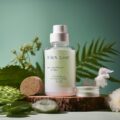Introduction to Skin Care Actives
Our skin is a remarkable organ, constantly working to protect us and keep us healthy. As we seek to care for our skin, it’s natural to want to understand the ingredients in our products. Skin care actives are the powerhouse components that drive real change in our skin’s health and appearance. But with so many scientific-sounding names on product labels, it can feel overwhelming to decipher what these ingredients actually do. This article aims to demystify some common skin care actives, helping you make informed choices with compassion for your skin’s unique needs.
Understanding the Basics: What Are Actives?
Skin care actives are ingredients that have been scientifically proven to change the behavior of the skin in some way. Unlike inactive ingredients which might hydrate or improve the texture of a product, actives work at a cellular level to address specific skin concerns. It’s important to remember that our skin is alive and constantly renewing itself. Actives work in harmony with this natural process, supporting our skin’s inherent ability to heal and regenerate.
Some common categories of actives include:
- Antioxidants
- Exfoliants
- Hydrators
- Brighteners
- Anti-aging compounds
Key Actives and Their Benefits
Let’s explore some popular skin care actives and how they can support our skin’s wellbeing:
Vitamin C
Vitamin C is a powerful antioxidant that helps protect the skin from environmental stressors. It can brighten the complexion, even out skin tone, and support collagen production. Vitamin C is like a nurturing friend for your skin, offering protection and encouragement for a healthy glow.
Retinoids
Derived from Vitamin A, retinoids are renowned for their ability to increase cell turnover and stimulate collagen production. They can help with fine lines, acne, and overall skin texture. Think of retinoids as a gentle coach, motivating your skin cells to perform at their best.
Hyaluronic Acid
A naturally occurring substance in our skin, hyaluronic acid is a hydration superstar. It can hold up to 1000 times its weight in water, helping to keep skin plump and moisturized. Hyaluronic acid is like a refreshing drink for your skin, quenching its thirst and helping it stay supple.
Niacinamide
Also known as Vitamin B3, niacinamide is a versatile active that can help with everything from reducing redness to improving skin barrier function. It’s a soothing presence in your skincare routine, calming irritation and supporting overall skin health.
Incorporating Actives into Your Routine
When introducing actives into your skincare routine, it’s important to do so with patience and kindness towards your skin. Here are some tips:
- Start slowly: Introduce one new active at a time, allowing your skin to adjust.
- Listen to your skin: If you experience irritation, reduce frequency or concentration.
- Be consistent: Actives often take time to show results, so stick with it.
- Don’t overdo it: More is not always better. Follow recommended usage guidelines.
- Protect your skin: Many actives can increase sun sensitivity, so always use sunscreen.
Remember, skincare is a journey, not a destination. It’s about nurturing and supporting your skin over time, not achieving instant perfection.
The Importance of a Holistic Approach
While actives can be powerful tools in our skincare arsenal, it’s crucial to remember that skin health is about more than just what we put on our face. A holistic approach to skin care includes:
- Staying hydrated
- Eating a balanced, nutrient-rich diet
- Getting enough sleep
- Managing stress
- Protecting skin from excessive sun exposure
These lifestyle factors work in tandem with topical actives to support overall skin health and radiance. By taking care of our whole selves, we create an environment where our skin can thrive.
Embracing Your Skin’s Unique Journey
As we explore the world of skin care actives, it’s important to maintain a compassionate perspective. Every person’s skin is unique, with its own needs and responses. What works wonders for one person may not be suitable for another, and that’s perfectly okay. The goal of understanding skin care actives isn’t to achieve some unrealistic standard of perfection, but to support and nurture our skin in a way that enhances our overall wellbeing.
Remember, your skin is already incredible. It protects you, helps regulate your temperature, and even produces vitamin D. By incorporating actives thoughtfully and kindly into your routine, you’re not fixing something that’s broken, but rather supporting an already amazing organ to function at its best.
Frequently Asked Questions
1. How long does it take to see results from skin care actives?
It varies depending on the active and your skin, but generally, you might start to see some changes in 4-6 weeks. For more significant results, it can take 3-6 months of consistent use. Remember, skincare is a journey, so patience is key!
2. Can I use multiple actives in my routine?
Yes, you can, but it’s important to introduce them gradually and be mindful of potential interactions. Some actives work well together, while others may cause irritation when combined. Always research or consult a dermatologist when mixing actives.
3. Are natural ingredients considered actives?
Some natural ingredients can indeed be actives if they’ve been scientifically proven to change skin behavior. Examples include certain plant extracts with antioxidant properties. However, not all natural ingredients are actives, and not all actives are natural.
4. Do I need to use actives in my skincare routine?
While actives can be beneficial, they’re not essential for everyone. If you’re happy with your skin and it’s healthy, you may not need to incorporate actives. It’s always about what works best for you and makes you feel good in your skin.
5. Can actives be too strong for my skin?
Yes, some actives can be too potent for certain skin types, especially if used incorrectly. It’s important to start with lower concentrations and build up tolerance. If you experience persistent redness, irritation, or discomfort, the active may be too strong, and you should consult a dermatologist.
Remember, the goal of skincare is to support and nurture your skin, not to fight against it. By understanding actives and using them mindfully, you can develop a routine that helps your skin look and feel its best, enhancing your natural radiance and boosting your overall wellbeing.









